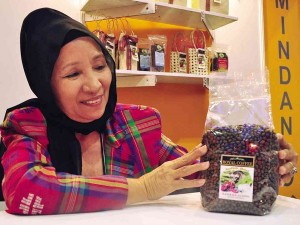
Philippine civet cat coffee displayed at a Philippine fair. At least P77 billion in fresh investments may be needed over the next five years to boost local coffee production and meet the needs of local firms, says Pierre Cote, manager-proprietor of Rocky Mountain Arabica Coffee Co.
MANILA, Philippines—At least P77 billion in fresh investments may be needed over the next five years to boost local coffee production and meet the needs of local firms, an industry player said.
The proposed amount can be used for nurseries (P646. 49 million), seedlings (P3.232 billion), fertilizer (P62.44 billion) and plantation development (P10.77 billion), said Pierre Cote, manager-proprietor of Rocky Mountain Arabica Coffee Co. (RMACC).
The investment is expected to help turn the Philippines from an importer to a self-sufficient grower of coffee beans. This is why key players in the local coffee industry, like RMACC, have been advocating for the replacement of the country’s coffee importation with domestic production.
In a statement issued by the Department of Trade and Industry, Cote was quoted as saying that some 13,000 hectares of coffee plantations should be developed over the next five years, and 20,000 hectares within a 15-year period starting 2018.
To achieve these objectives, “we need to plant 20 million coffee trees per year over the next five years, and 30 million coffee trees per year thereafter,” Cote said.
The money may be sourced from private sector equity and debt financing. Small farmers and cooperatives may tap the Agricultural Guarantee Fund Pool (AGFP) to secure the required fund, Cote further said.
At present, the Philippines accounted for only less than 1 percent of the total global production.
In 2012, the volume of dried coffee berries production amounted to 88,843 metric tons (MT), while green beans production totaled 39,181 MT, according to Myrna P. Pablo, regional director for the DTI Cordillera Administrative Region.
It is estimated that, by end-2013, the Philippines would have imported 40,000 metric tons of coffee to sustain local consumption.